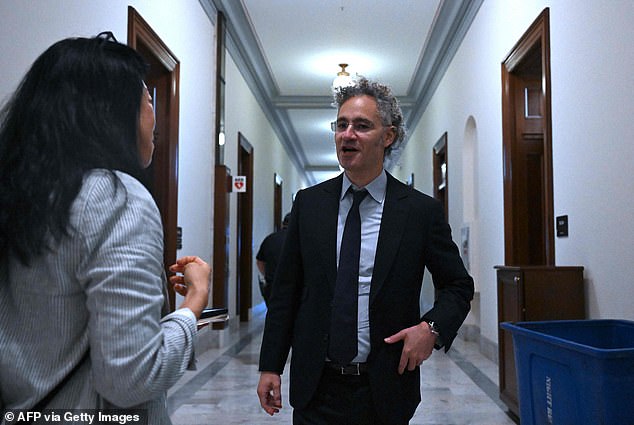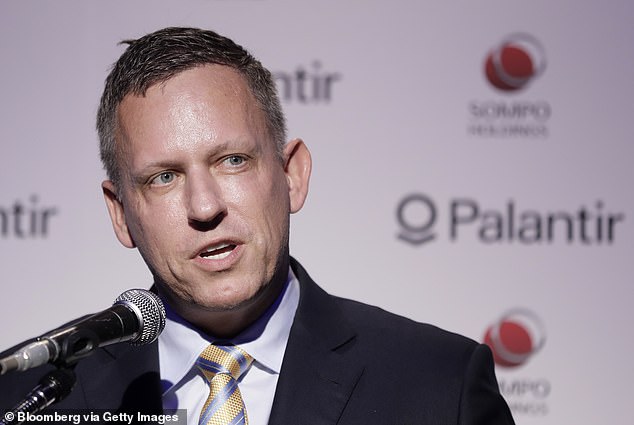Controversial US tech giant Palantir ‘set to win £480million NHS contract to manage your patient data’
NHS bosses are considering offering a £480 million contract to process patient data to a controversial US tech giant, it was claimed today.
Palantir is the front runner to win the seven-year deal, which would see it provide a ‘federated data platform’ to connect health and social care IT systems in England.
It would effectively bring together patient records between hospitals, which health chiefs say will improve healthcare, reduce waiting times and speed up diagnoses.
The software company, which has close ties with the US military and has helped the Ukrainian armed forces in the fight against Russia, is expected to receive the contract in mid-October.
Some senior NHS medics are nervous about the company’s role and the reasoning behind the plan, while campaign groups have called for the use of data within the NHS to be made ‘transparent’.
But Sir Chris Whitty, Britain’s chief medical officer, has argued that failure to share patient data within the NHS could hinder treatment and ‘in some cases be dangerous’.
Palantir is in ‘pole position’ to win the seven-year deal, which will see it provide a ‘federated data platform’ to connect healthcare and social care IT systems
Palantir specializes in processing and analyzing large amounts of data.
It was founded by billionaire Peter Thiel – who remains chairman of the company and has close ties to Donald Trump – after the September 11 terrorist attacks to use technology in the fight against terrorism.
Initial customers included U.S. government agencies, primarily in the intelligence community, the Pentagon and law enforcement.
Mr Thiel, co-founder of PayPal, has likened Britain’s affection for the NHS to the “Stockholm syndrome” and said the service is “making people sick”. He called for the service to be closed down and started again, with parts of it privatized.
Palantir’s boss Alex Karp said he disagrees with the comments Thiel made as a “private individual.”
Mr. Karp said he wished the U.S. had a health care system “that served the poor and disadvantaged as well as I believe the British system does.”
During the Covid pandemic, the NHS used the company’s Foundary software to track its vaccine rollout, providing officials and health chiefs with data on uptake by age, gender, ethnicity and GP practice.
The system has since been used by Chelsea and Westminster NHS Trust. Palantir writes that the software has reduced the waiting list by a quarter and increased theater capacity by a tenth.
However, some senior doctors are concerned that the NHS has not set out the full rationale for the project, as well as the role Palantir will play in providing a ‘federated data platform’, according to The Times.
Sam Smith, from campaign group medConfidential, told MailOnline: ‘Patients need to know how data about them is being used, so they can see that it has been used when it should be, and not accessed when it shouldn’t have been.
‘No patient should ever consider not telling their doctor something vital to their care for fear that the NHS will share the most sensitive details somewhere they shouldn’t.
‘Any use of data in this system must be transparent to patients, who know how their right to object will be respected or ignored.’
NHS says the software will connect data and improve decision making by bringing disparate systems together into one secure environment to improve patient care.
It says the company providing the system will only operate under instructions from the NHS and will not have control over the data on the platform, nor will they be allowed to access, use or share it for their own purposes .
The health service has also introduced safeguards to prevent suppliers from playing a dominant role in NHS data management.
British software company Quantexa has submitted a rival bid for the NHS contract and recently appointed former GCHQ boss Sir Jeremy Fleming and Matthew Gould, former head of the health service’s digital unit.
The American computer technology company Oracle is also trying to win the contract, the newspaper said.
It comes today as an article by Sir Chris, published by the Department of Health, states that sharing NHS data will improve healthcare.
As it stands now, healthcare has multiple data systems that “don’t talk to each other,” and that needs to change, he said.
He warned that failure to share data between different parts of the NHS means that not all healthcare staff are aware of important information about patients.

Palantir boss Alex Karp said he wished the US had a health care system “that served the poor and disadvantaged as well as I believe the British system does.”
‘If a doctor or nurse in one part of the NHS does not know important facts from another, this can reduce the effectiveness of treatment and in some cases be dangerous,’ he said.
Data sharing will also increase effectiveness in healthcare and boost medical research, which will improve healthcare in the future, Sir Chris said.
He wrote: ‘The more complete the data for all these uses, the more effective current and future health care will be.
“By allowing the use of our data we benefit ourselves and others, but we also have an absolute expectation that this data will be kept secure, private and used only for legitimate purposes.”
He pointed to the way data was used during the pandemic, which helped health leaders know where hospitals had capacity and which emergency departments were under greater pressure.
Full details of the deal – and whether patients have the right to opt out – have not yet been shared.
It comes as the NHS today launched a ‘programme of national conversations’ to gather patients’ views on how their health data will be used.
Joanna Peller, head of healthcare at Palantir, said: ‘While we cannot comment on a live tender, we are proud to have supported the NHS during Covid as our software powered the vaccine rollout and ensured ventilators were supplied sent to where they were needed most. .
‘It will now help reduce the backlog in care and ensure patients get vital treatment faster in 36 NHS Trusts across England.

It was founded by billionaire Peter Thiel – who remains chairman of the company and has close ties to Donald Trump – after the September 11 terrorist attacks to use technology in the fight against terrorism
‘We have seen the benefits at NHS Trusts such as Chelsea and Westminster, where our software has helped reduce inpatient waiting lists by 28 per cent and increase theater use by 13 per cent when it was first deployed, and where operations performed on were canceled on the day itself, having since fallen by half.
‘But that’s what we do: provide software.
‘We are not in the business of collecting, mining or selling data – we simply provide our customers with tools to help them organize and understand their own information.
‘These tools are built in such a way that access to data, including for what purpose and for how long, is entirely dictated by the customer.’
Dr. Vin Diwakar, National Director of Transformation at NHS England, said: ‘Better use of data will bring huge benefits for patients, enable more collaborative care and better use of NHS resources, and lead to faster cancer diagnosis and shorter waiting times for electives. operations and fewer hospital admissions.
‘Public support is integral to how we can better use data to improve care – and the best way to do this is through effective and meaningful engagement.
‘Over the course of next year we will continue to highlight how data is used across the health and care system and it is vital that we engage the public in shaping future data use and how it can save lives.’
